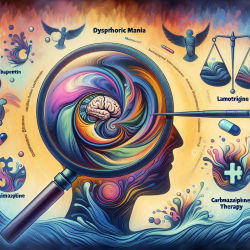The treatment of dysphoric mania presents a unique challenge for mental health practitioners due to the simultaneous presence of manic and depressive symptoms. Recent research conducted by Mokhber et al. (2008) in Iran has provided valuable insights into the effectiveness of anticonvulsant treatments such as gabapentin, lamotrigine, and carbamazepine. This blog aims to help practitioners enhance their skills by implementing the outcomes of this study or encouraging further research.
The Study Overview
The study involved 51 patients diagnosed with dysphoric mania, who were randomized into three groups to receive either gabapentin, lamotrigine, or carbamazepine over an eight-week period. The Minnesota Multiphasic Personality Inventory-2 (MMPI-2) was used to measure changes in depression and mania symptoms.
Key Findings
- Gabapentin: Showed the greatest improvement in depressive symptoms with a 50% decrease in depression scores.
- Lamotrigine: Demonstrated a 33% decrease in depression scores.
- Carbamazepine: Resulted in a 13% decrease in depression scores.
No significant differences were found between the groups regarding improvements in manic symptoms, indicating that all three medications were effective in this regard.
Implications for Practitioners
The findings suggest that anticonvulsants can be effective monotherapy options for treating dysphoric mania. Practitioners should consider the following when implementing these treatments:
- Selecting Appropriate Medication: Gabapentin may be particularly beneficial for patients with prominent depressive symptoms.
- Cultural Considerations: The MMPI-2's cross-cultural sensitivity makes it a suitable tool for diverse populations, as demonstrated by its use in this Iranian study.
The Need for Further Research
This study highlights the potential of anticonvulsants in treating dysphoric mania but also underscores the need for further research. Future studies could explore:
- The effects of combining anticonvulsants with other mood stabilizers like lithium or valproate.
- Larger sample sizes to validate findings and assess long-term efficacy.
The study also points out limitations such as the absence of a control group and variance in baseline depression scores, which future research should address.
A Call to Action
Mental health practitioners are encouraged to delve deeper into the potential of anticonvulsants for treating dysphoric mania. By staying informed about ongoing research and participating in clinical trials, practitioners can contribute to refining treatment strategies and improving patient outcomes.
If you are interested in exploring this topic further, we recommend reading the original research paper: Anticonvulsant treatments of dysphoric mania: a trial of gabapentin, lamotrigine and carbamazepine in Iran.










